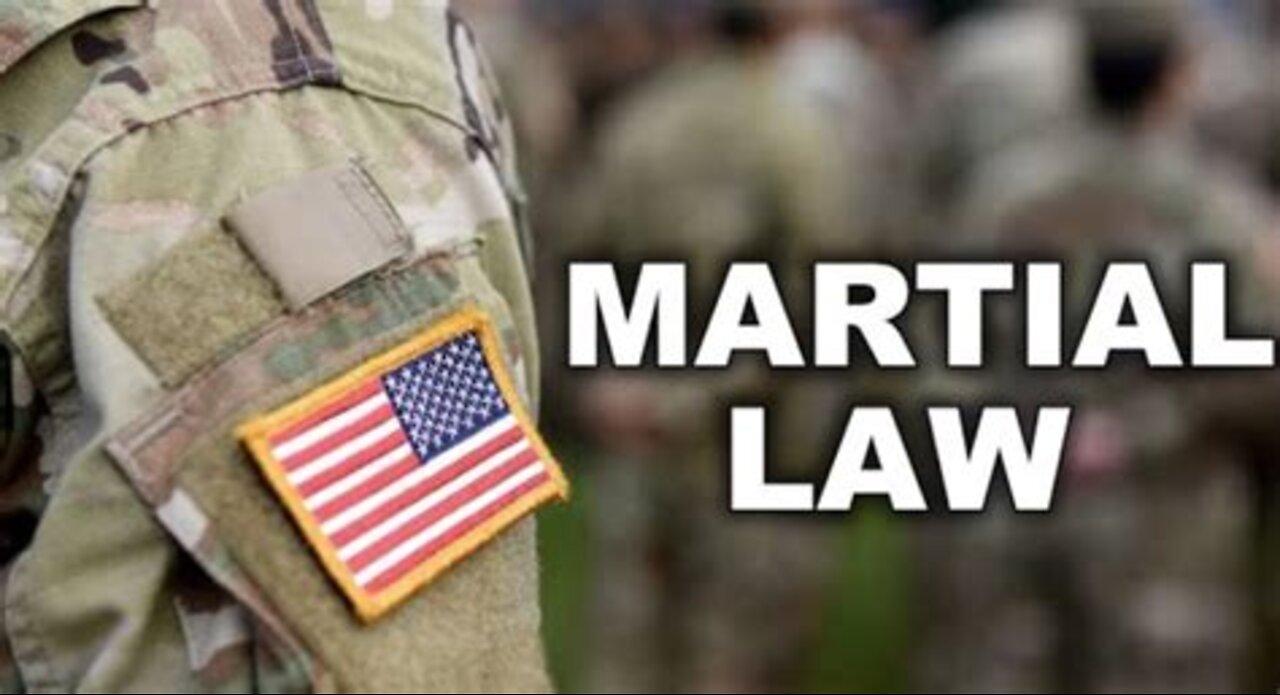Premium Only Content

Legalizes martial law in the United States
Hold Americans in Fema Detention Center NDAA Sections 1021 and 1022
House floor speech on the unconstitutional provisions of the NDAA bill.
NDAA Sections 1021 and 1022: Scary Potential
https://tenthamendmentcenter.com/2012/02/06/ndaa-sections-1021-and-1022-scary-potential/
H.R. 645 (111th): National Emergency Centers Establishment Act
https://www.govinfo.gov/content/pkg/BILLS-111hr645ih/pdf/BILLS-111hr645ih.pdf
NDAA: What Obama Hoped You Wouldn't Notice About This Bill
https://www.mic.com/articles/22837/ndaa-what-obama-hoped-you-wouldn-t-notice-about-this-bill
White House which appeared to push the idea of martial law.
https://au.news.yahoo.com/martial-law-alarming-detail-trump-allys-memo-051108738.html
The NDAA and the Death of the Democratic State
https://www.truthdig.com/articles/the-ndaa-and-the-death-of-the-democratic-state/
NDAA Sections 1021 and 1022: Scary Potential
By: Rob Natelson|Published on: Feb 6, 2012|Categories: Current Events, Featured, Founding Principles
Are the detainment provisions of the 2012 National Defense Authorization Act serious?
Yes they are.
This is a complicated area, and there has been a lot of word-fudging in spinning this subject. So bear with me as we take things step by step.
* The U.S. Constitution generally guarantees the “Privilege of the Writ of Habeas Corpus.” The writ of habeas corpus is a court order a prisoner can obtain requiring the jailer to come into court and justify his detention of the prisoner. It is a traditional way in which those held can demand a fair trial by jury in a civilian court. The writ of habeas corpus is a treasured part of our traditional liberty. Belief that the British were infringing it was one cause of the American Revolution. (The writ is called a “privilege” rather than a “right” because it is a creation of the legal system rather than a natural right, like the right to free speech.)
* By the Constitution’s original meaning, the privilege of habeas corpus is guaranteed to all those in “allegiance” to the United States. “Allegiance” is an old technical legal term that includes both citizens and aliens legally in the country.
* By successfully convincing a judge to issue a writ of habeas corpus, citizens, foreign visitors, and legal residents may obtain a hearing that may induce the judge to order a civilian trial. It matters not how heinous the crimes they are accused of. For example, a person charged with trying to blow up a building on behalf of a foreign power can be charged with treason. But while still merely accused, he is entitled to all the protections of due process, including a fair, public trial before a jury of his peers.
* By the Constitution’s original meaning, habeas corpus does NOT apply if the Congress, as an incident to its war power, “suspends” the writ for a particular time and place. However, the Constitution says that Congress may “suspend” the writ only “when in cases of rebellion or invasion the public safety may require it.” Congress has not suspended the writ, and it is doubtful that occasional acts of terrorism constitute a sufficient “rebellion or invasion” to justify doing so. Even if Congress could suspend the writ, a Bill of Suspension would be a serious, much-debated measure for which Congress would have to assume direct political accountability. Political accountability is not a big priority with Congress right now.
* Members of all belligerent armed forces (both sides) are subject to military, not civilian, law.
* Thus, by the law of war, the executive (and the military officers under him) may incarcerate for the duration of the conflict any enemy combatants captured in the theater of war.
* By the Constitution’s original meaning the executive has no constitutional power (without formal congressional suspension of the writ) to lock up citizens or lawful aliens apprehended outside the war theater. If accused of crime, the accused has the privilege of a jury trial in a civilian court. By the Constitution’s original meaning, this constitutional right does not apply to enemy aliens, wherever apprehended.
* In 2008, the U.S. Supreme Court (erroneously, in my view) held that alien Guantanamo detainees have the right to habeas corpus to determine if they are really enemy combatants. Still, under this case if they are found to be enemy combatants they can go back to prison indefinitely.
Now, with that background, let’s look at the critical language of the Act, again step by step:
§1021: (a) Congress affirms that the authority of the President to use all necessary and appropriate force pursuant to the Authorization for Use of Military Force . . . includes the authority for the Armed Forces of the United States to detain covered persons . . . pending disposition under the law of war.
original link by CongressmanRonPaul
-
 31:43
31:43
Watchman's Duty
3 days agoSam Shamoun EDUCATES PRO-ISRAEL Christian BRAINWASHED for 20 Years
1.79K10 -
 LIVE
LIVE
vivafrei
1 hour agoFrom "Elbows Uo" to "KISS THE RING!" Carney Meets with Trump! Live with Mario Zelaya & MORE!
18,904 watching -
 LIVE
LIVE
Redacted News
52 minutes agoWhy is Ukraine ramping up MASSIVE attacks on civilians as U.S. sends more weapons to Kiev | Redacted
6,609 watching -
 LIVE
LIVE
Untamed Nation
21 hours agoTRUMP DEMANDS DOJ FREE TINA PETERS NOW! Matt Wallace and Joe Oltmann | 6 May 2025
852 watching -
 50:04
50:04
Coin Stories with Natalie Brunell
3 hours agoAmerica's Golden Age or Tough Times Ahead? Col. Macgregor on Global Trade War & Financial Reckoning
955 -
 22:18
22:18
Michael Franzese
1 hour agoHow Many Epstein Accusers Have to Die Before We Get the Truth?
3.55K6 -
 1:17:09
1:17:09
Awaken With JP
4 hours agoDiddy List: Names Have Been Named - LIES Ep 90
116K38 -
 2:12:41
2:12:41
The Quartering
3 hours agoDaily Wire CIVIL WAR Over Karmelo Anthony, GTA 6 Trailer Drops, Lady Gaga TERROR Attack & More
112K32 -
 30:00
30:00
Clownfish TV
10 hours agoDisney Adults: Don't Call Disney Woke!
8.28K12 -
 LIVE
LIVE
LetsTalkNumbers
24 minutes agoSeason 2 Ep 2: Should Joker be the MVP
19 watching